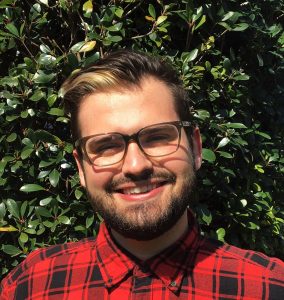 Soy un estudiante PhD trabajando con la Dra. Heike Sederoff aquí en NCSU. En la universidad, mis especializaciones eran la biología y el español. Durante mis estudios universitarios pasé un semestre en la Universidad de Guanajuato, México como estudiante extranjero. Allá aprendí hablar español y a la vez se me encantó la idea de ciencia global.
Soy un estudiante PhD trabajando con la Dra. Heike Sederoff aquí en NCSU. En la universidad, mis especializaciones eran la biología y el español. Durante mis estudios universitarios pasé un semestre en la Universidad de Guanajuato, México como estudiante extranjero. Allá aprendí hablar español y a la vez se me encantó la idea de ciencia global.
Mi investigacción se trata de las aplicaciones de la ingeniería metabólica y la biología sintética. Tengo mucho interés en el uso de esas herramientas para el cambio climático y el desarrollo de una economía más verde. Mi tesis doctoral se trata del uso de un metabolismo sintético para mejorar la capacidad photosintética de plantas. Esta metabolismo se inspira del reverso TCA ciclo de bacteria anaeróbica y autotróphica. Usamos Camelina sativa, una planta con uso en biocombustibles, para aprender cómo un metabolismo así puede añadir a la fisología vegetal.
Creo que hay mucha oportunidad en la ingeniería metabólica y la biología sintética, pero la polémica sobre ella necesita más atención a la educación y discusión pública. Así, soy interesado en los initiativos de ciencia pública, la educación pública, y el acceso científico.
——————————————————————————————————————————————————–
I am a PhD student working with Dr. Heike Sederoff here at NCSU. In college, I majored in Biology and Spanish/Hispanic Cultures. During this time, I was gifted the opportunity to study abroad in Guanajuato, Mexico. There, I learned how to speak better Spanish and also fell in love with the idea of global science.
My research interests lie in the applications of metabolic engineering and synthetic biology to plants, especially to solve problems related to climate change and the development of a greener economy. My dissertation focuses on the use of a synthetic metabolism to enhance plants’ ability to fix inorganic carbon from the atmosphere (CO2). This metabolism is inspired by the reverse TCA cycle of certain autotrophic anaerobic bacteria. We use the emerging biofuel crop Camelina sativa as a model to understand how such increases in carbon fixation could translate to changes in overall plant physiology.
While I see vast potential in the field of metabolic engineering and synthetic biology, the polemic surrounding genetic engineering needs to be addressed. As such, I am also interested in citizen science initiatives, engaging scientific communication/discussion, and making science accessible to all.
Publications
S. Kuznetsov, C. Doonan, N. Wilson, S. Mohan, S. Hudson, E. Paulos. 2015. DIYbio Things: Open Source Biology Tools as Platforms for Hybrid Knowledge Production and Scientific Participation. CHI’ 15 Seoul, Korea.
Education & Training
B.Sc. Biology & Spanish/Hispanic Cultures – Juniata College, 2013
Researcher I, Dept. of Biological Sciences – Carnegie Mellon University 2013-2015
Research Technician, Dept. of Biochemistry, Microbiology, and Molecular Biology – Pennsylvania State University 2015-2016